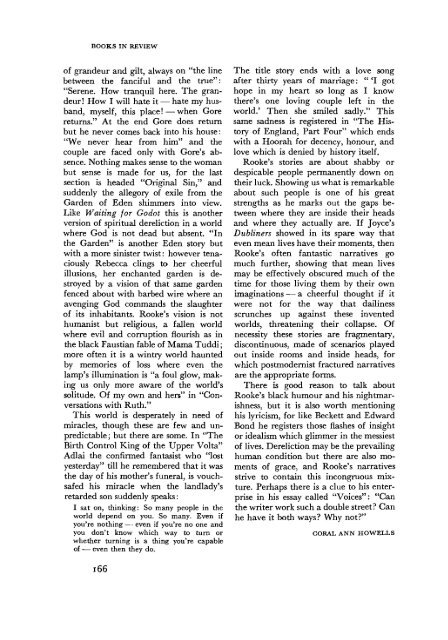\s mYevtew KALEIDOSCOPE - University of British Columbia
\s mYevtew KALEIDOSCOPE - University of British Columbia
\s mYevtew KALEIDOSCOPE - University of British Columbia
- No tags were found...
Create successful ePaper yourself
Turn your PDF publications into a flip-book with our unique Google optimized e-Paper software.
BOOKS IN REVIEW<strong>of</strong> grandeur and gilt, always on "the linebetween the fanciful and the true":"Serene. How tranquil here. The grandeur!How I will hate it — hate my husband,myself, this place ! — when Gorereturns." At the end Gore does returnbut he never comes back into his house:"We never hear from him" and thecouple are faced only with Gore's absence.Nothing makes sense to the womanbut sense is made for us, for the lastsection is headed "Original Sin," andsuddenly the allegory <strong>of</strong> exile from theGarden <strong>of</strong> Eden shimmers into view.Like Waiting for Godot this is anotherversion <strong>of</strong> spiritual dereliction in a worldwhere God is not dead but absent. "Inthe Garden" is another Eden story butwith a more sinister twist : however tenaciouslyRebecca clings to her cheerfulillusions, her enchanted garden is destroyedby a vision <strong>of</strong> that same gardenfenced about with barbed wire where anavenging God commands the slaughter<strong>of</strong> its inhabitants. Rooke's vision is nothumanist but religious, a fallen worldwhere evil and corruption flourish as inthe black Faustian fable <strong>of</strong> Mama Tuddi ;more <strong>of</strong>ten it is a wintry world hauntedby memories <strong>of</strong> loss where even thelamp's illumination is "a foul glow, makingus only more aware <strong>of</strong> the world'ssolitude. Of my own and hers" in "Conversationswith Ruth."This world is desperately in need <strong>of</strong>miracles, though these are few and unpredictable;but there are some. In "TheBirth Control King <strong>of</strong> the Upper Volta"Adlai the confirmed fantasist who "lostyesterday" till he remembered that it wasthe day <strong>of</strong> his mother's funeral, is vouchsafedhis miracle when the landlady'sretarded son suddenly speaks :I sat on, thinking: So many people in theworld depend on you. So many. Even ifyou're nothing — even if you're no one andyou don't know which way to turn orwhether turning is a thing you're capable<strong>of</strong> — even then they do.The title story ends with a love songafter thirty years <strong>of</strong> marriage: " Ί gothope in my heart so long as I knowthere's one loving couple left in theworld.' Then she smiled sadly." Thissame sadness is registered in "The History<strong>of</strong> England, Part Four" which endswith a Hoorah for decency, honour, andlove which is denied by history itself.Rooke's stories are about shabby ordespicable people permanently down ontheir luck. Showing us what is remarkableabout such people is one <strong>of</strong> his greatstrengths as he marks out the gaps betweenwhere they are inside their headsand where they actually are. If Joyce'sDubliners showed in its spare way thateven mean lives have their moments, thenRooke's <strong>of</strong>ten fantastic narratives gomuch further, showing that mean livesmay be effectively obscured much <strong>of</strong> thetime for those living them by their ownimaginations — a cheerful thought if itwere not for the way that dailinessscrunches up against these inventedworlds, threatening their collapse. Ofnecessity these stories are fragmentary,discontinuous, made <strong>of</strong> scenarios playedout inside rooms and inside heads, forwhich postmodernist fractured narrativesare the appropriate forms.There is good reason to talk aboutRooke's black humour and his nightmarishness,but it is also worth mentioninghis lyricism, for like Beckett and EdwardBond he registers those flashes <strong>of</strong> insightor idealism which glimmer in the messiest<strong>of</strong> lives. Dereliction may be the prevailinghuman condition but there are also moments<strong>of</strong> grace, and Rooke's narrativesstrive to contain this incongruous mixture.Perhaps there is a clue to his enterprisein his essay called "Voices": "Canthe writer work such a double street? Canhe have it both ways? Why not?"CORAL ANN HOWELLS166
















